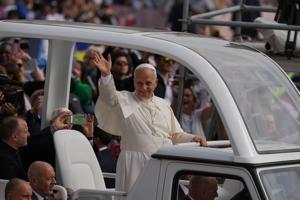Pope Leo XIV is set to make his inaugural foreign journey next month, visiting Turkey and Lebanon from November 27 to December 2. The Vatican announced this significant trip on Tuesday, emphasizing its importance as a gesture of unity between Christians and Muslims. This pilgrimage follows plans laid out by his predecessor, Pope Francis, who had intended to visit these nations.
In Turkey, the pope’s itinerary includes a pilgrimage to Iznik, commemorating the **1,700th anniversary** of the **Council of Nicea**. This council, which took place in **325 A.D.**, represents a crucial moment in Christian history, being the first ecumenical council recognized by both Catholic and Orthodox churches. The event holds particular relevance for current Catholic-Orthodox relations, especially as it predates the historical schisms that divided the two branches of Christianity.
Pope Francis had hoped to mark this anniversary with a visit to Turkey in May, following an invitation from **Patriarch Bartholomew I**, the spiritual leader of the world’s Orthodox Christians. Unfortunately, Francis passed away in April, but Leo XIV has expressed his commitment to honoring his predecessor’s plans.
Lebanon’s President **Joseph Aoun** announced the pope’s visit via social media, though details regarding the trip’s full itinerary will be released later. The timing of this visit coincides with the anniversary of the **October 7 attacks** in southern Israel, providing Pope Leo XIV an opportunity to address broader issues of peace in the Middle East, particularly concerning the plight of Christians in the region.
The pope has been a consistent advocate for peace and dialogue, especially as tensions escalate in areas such as Gaza. Lebanon, with its population of approximately **6 million**—including over **1 million** Syrian and Palestinian refugees—boasts the highest percentage of Christians in the Middle East. It is also notable for being the only Arab nation with a Christian head of state.
Lebanon has faced significant political and economic challenges in recent years, which have raised concerns about the safety and stability of its Christian community. The country is still recovering from a devastating economic crisis and the aftermath of a war between Israel and the militant group **Hezbollah** that culminated in a ceasefire in November.
While a new reformist government has sparked hope for recovery, the ongoing situation remains precarious. Israel continues its military presence along the Lebanese border and conducts frequent airstrikes aimed at curbing Hezbollah’s activities. The group faces mounting pressure to disarm, although it has resisted such calls until Israel withdraws.
Patriarch **Bechara Boutros Raï**, head of Lebanon’s Maronite Church, expressed optimism regarding the pope’s visit. He stated, “We hope that this apostolic visit to Lebanon will bring peace and stability and be a sign of unity for all Lebanese, Christians and Muslims alike, at this critical stage in our nation’s history.”
The announcement of the pope’s trip has also drawn attention to the delicate diplomatic position of the Vatican. Recently, Israel criticized the Vatican’s comments regarding the October 7 attacks, specifically remarks from **Cardinal Pietro Parolin**, who condemned violence on both sides but described Israel’s actions in Gaza as disproportionate. The Israeli Embassy to the Holy See expressed concern that such statements could hinder efforts to resolve ongoing conflicts and combat rising antisemitism.
The Vatican’s approach requires a careful balance, as it seeks to maintain its tradition of diplomatic neutrality while addressing sensitive issues in the Middle East. The last papal visit to Lebanon occurred in **September 2012** with Pope Benedict XVI, making Leo XIV’s upcoming trip particularly significant for both religious and geopolitical reasons.
As preparations unfold, many in Lebanon and beyond await the visit with anticipation, hoping for a message of hope amid ongoing unrest.
